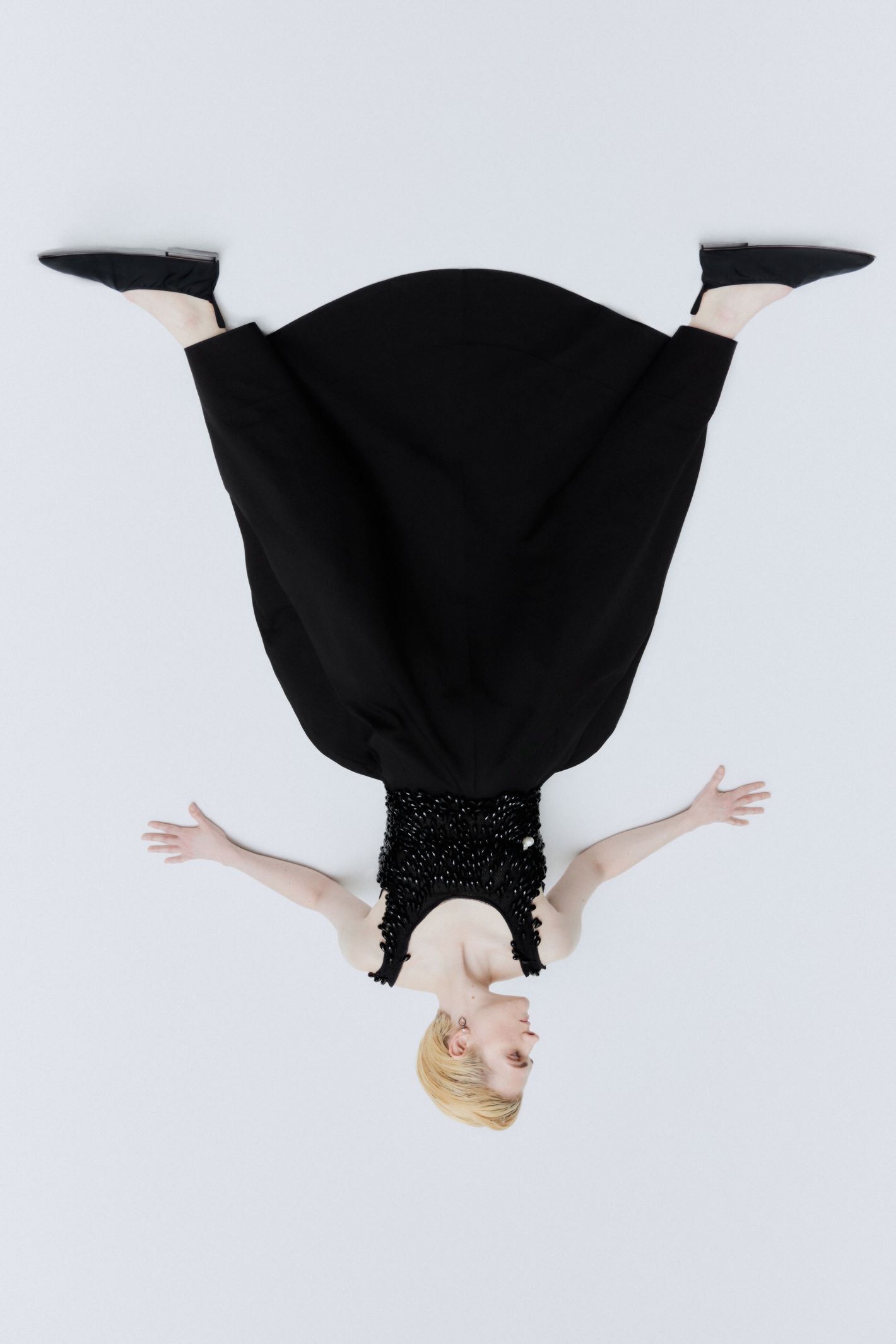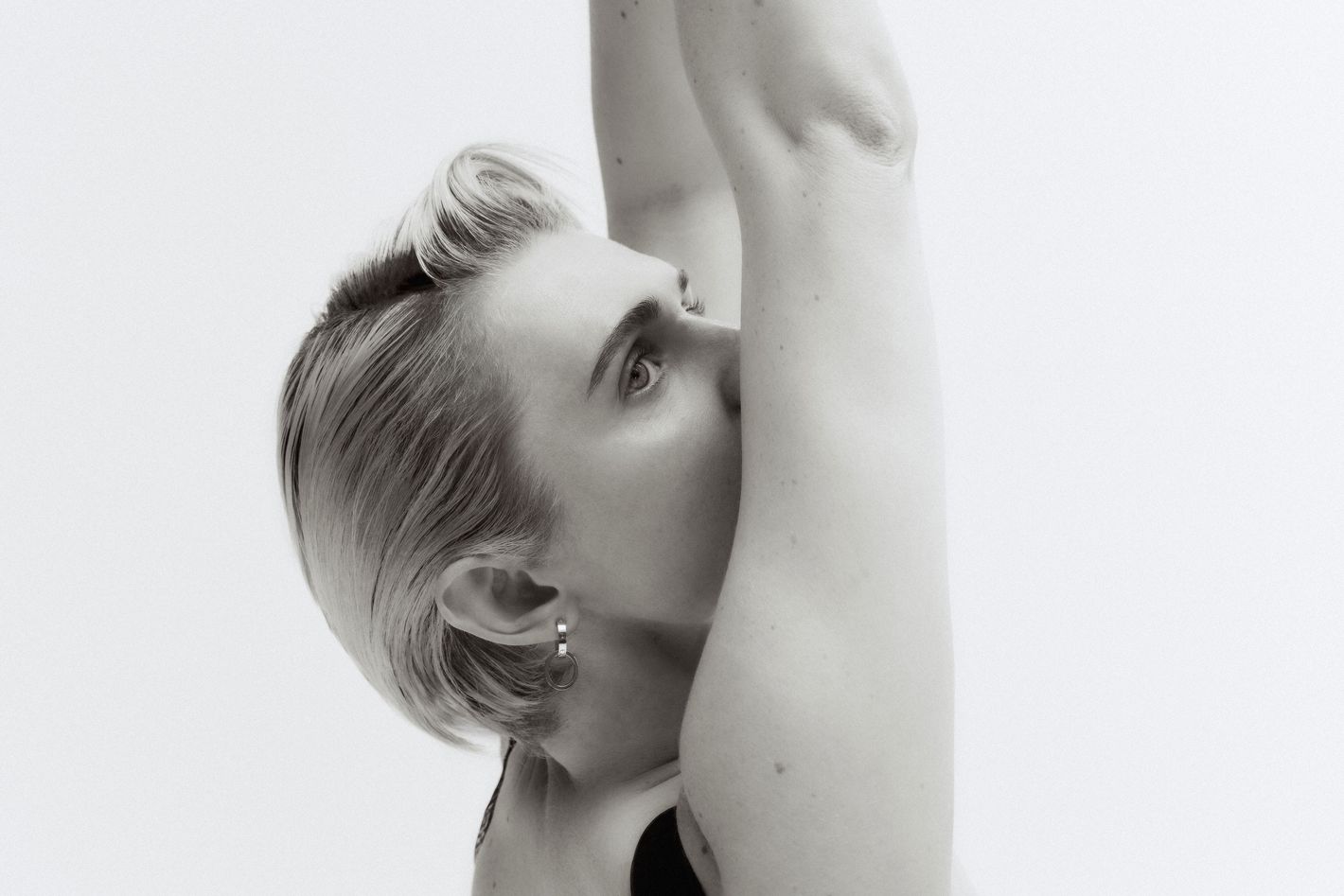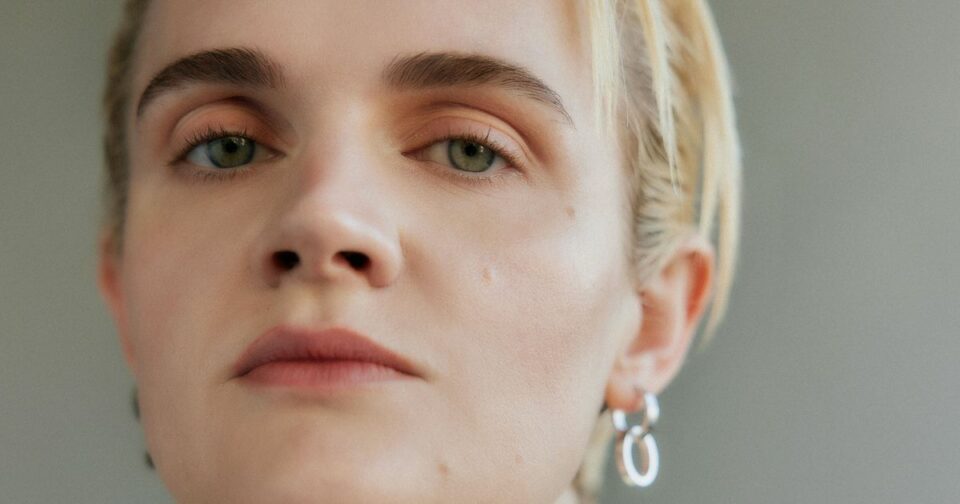[ad_1]

Gayle Rankin has been posting photos to Instagram of her emerald-green manicures in various states of decay. Following each day of performances of Broadway’s latest revival of Cabaret, she returns to her dressing room to shed as much as she can of the Kit Kat Club’s tragedienne Sally Bowles before decamping to her West Village apartment. But the green is always there, as the Juilliard-trained actress digs her claws into a character immortalized for evading understanding. “That’s Sally’s color, but it’s also my favorite color,” Rankin says. “My birthstone is peridot. It’s like a pea-green, sharp spring color. There’s something that has to do with rebirth and newness that I love about it.”
I first met the 34-year-old actress at Café Cluny in the Village, just weeks before she submerged herself in one of the most coveted roles in musical theater. The dimly lit celebrity hot spot is unusually quiet for the weekday brunch hour until Rankin arrives at the bistro like a civilized tornado. Tech rehearsals ran late and she didn’t get home until 2 a.m. the night before, she explains, untying a silk headscarf á la Brigitte Bardot. Her platinum-blonde hair is combed back from her face, and she sports minimal makeup as she collapses into the booth, apologizing for her frenetic state. Behind her, a halo of 28 pinned butterflies from 1920s Williamsburg, Iowa, frame her bleached bob. “I don’t know if it ever gets robotic for me, but it does become more meditative,” she laughs of her attempts to wrestle eight performances a week. “Right now, it’s really very present and very alive. But Mommy’s tired. Mommy needs a holiday.”
This isn’t Rankin’s first time appearing in Cabaret. In 2014, she was cast as the Nazi sympathizer and sex worker Fräulein Kost in Sam Mendes’s staging of the show. But Sally, who was played by Michelle Williams then, is a different creature entirely. Familiarity with the material can only prepare one so much for a character who embodies the bitter seduction — if not the cultural legacy spanning almost a century — of Cabaret. That, plus Rankin is walking in the thigh-high heeled boots of all the Sallys before her, notably including Williams, Judi Dench, Liza Minnelli, and Olivier-winning Jessie Buckley of the recent West End production. Rankin tells me she’s been texting other Sallys — Buckley, Maude Apatow, Rebecca Lucy Taylor, and Cara Delevingne, who’s currently in the London show — but she carefully avoids defining her take on the role. Instead, her Sally is a psychic palimpsest of Sallys past. “People are always asking, ‘Who’s your Sally?’ Who have I created? What’s the version of her that I’m bringing to the world? And not to be really wanky, actor-y about it, but you’re not playing Sally. Sally’s playing you,” Rankin warns.


Since graduating from Juilliard in 2011 — the first Scottish citizen to do so, alongside classmates Mark Junek, the Oscar-nominated Danielle Brooks, Corey Hawkins, and Succession’s Justine Lupe — Rankin has scattered herself across roles, genres, and mediums. In the last decade, she’s inhabited an accordion-playing sex worker, an amateur wrestler with species dysphoria, a grieving 1930s mother, and an exasperated indie rocker. She’s been cast in Shakespeare (playing Ophelia opposite Oscar Isaac in the Public Theater’s Hamlet in 2017), mumblecore cinema (Noah Baumbach’s The Meyerowitz Stories), and prestige series alike (Max’s Perry Mason). And in yet another unexpected move, this June she’ll take on the witch Alys Rivers in the blockbuster second season of House of the Dragon on HBO. “Alys is a very mysterious character. I guess that is Gayle Rankin’s MO,” she says with a smile. “The mystery. The enigma.”
After years of flirting with the margins of mainstream success, Rankin is now faced with a part that will define both her career and her burgeoning celebrity, whether she’s ready to accept it or not. “I have always chosen roles, maybe in an unconscious way, to kind of contain and conceal my own identity, but I think that’s a little bit more out of my hands now,” she admits. “I’m extremely private, but I’m also the girl who sits down and is like, ‘So I started my period today, nice to meet you!’” In fact, Rankin says, she almost pulled out of the audition process for the part of Sally. The pressure of portraying such an idolized character started to mount, and part of her knew that if she stepped into this role, there’d be no more safety in anonymity. At the insistence of her agents, she stuck with it.
Director Rebecca Frecknall’s restaging of Cabaret, which chronicles the apathy that infected Weimar-era Berlin leading up to World War II, is unusually immersive: The audience is beckoned into the August Wilson Theatre with a shot of schnapps and tableside bottle service. Adapted from a 1939 Christopher Isherwood novel into a play, and then into a musical, audiences might most recognize Bob Fosse’s Oscar-winning interpretation, which cast Minnelli as its fishnet-clad cabaret singer with daddy issues, a whiskey habit, and delusions of grandeur. After Frecknall revived the show in London’s West End in 2021 to the tune of seven Olivier Awards, the 37-year-old director began the process of transferring the show — with Eddie Redmayne as its sinister emcee — to Broadway. Now, to her own shock, at the center of the round at the Kit Kat Club stands Gayle Rankin, serenading more than 1,000 theatergoers each night in a seafoam velvet and faux-fur coat.
Born just outside of Glasgow, Rankin was a quiet child who cherished her solitude, spending much of her time outdoors in the woods behind her family’s home. She fell in love with Judy Garland after watching A Star Is Born and listening to the 1961 live album Judy at Carnegie Hall. Despite her desire to perform, she had no familial ties to Hollywood royalty — her father was a career electrician and her mother chaperoned child actors on television sets. Her elder sister, she says, served as the “gregarious” foil to Rankin’s introvert. Often too afraid to speak for herself, she wound up making sense of the world through observation, parroting the actions she saw unfolding in front of her. Acting wasn’t just the next logical step, it was her childlike attempt at understanding the motivations of others. “I still feel like a voyeur when I’m acting,” she says. “I’m seeking, searching, looking for an act, or an audience, or the other characters, or the character I’m playing. Being viewed is not the main attraction.”

It’s not that Rankin is completely uninterested in fashioning herself the object of an audience, but that she does so somewhat begrudgingly. Connecting with her onlookers is a paradoxical desire that collides head-on with her hesitancy to be seen, and, when playing Sally, to occupy space as a sexual being. In most productions of Cabaret, Sally weaponizes her body in desperate attempts to manipulate those around her; she’s a man-eater who is at once avoidant and aggressive for the purposes of love, of sex, of safety and belonging. But Rankin, at Frecknall’s direction, has imbued her with more nuanced agency. She doesn’t blanket Sally with a cloying “Wonder Woman” treatment, but she doesn’t erase her mania, either. Much of Sally’s “hysteria,” Rankin says, is the by-product of existing during a shockingly dark time. She’s not a floozy in fringe, but a woman perennially on the edge. In her private life, Sally finds freedom where she can, choosing abortion, choosing the stage, choosing solitude. Rankin allows her these choices.
Throughout our meeting, Rankin toys with various pieces of cutlery to punctuate her points, and orders two scrambled eggs, dipping each bite in a dollop of sriracha and waving it around like a conductor’s baton. Her comedic timing is exact, often plopping her chin into the palm of her hand for dramatic effect, elsewhere leaning forward to offer an arched eyebrow, laying her sarcasm on thick and peppering her sentences with “babe.” It’s a well-choreographed — but not deviously so — routine, not dissimilar from the one Sally uses to seduce her nightclub patrons. “Our choreographer Julie Chang has given me such confidence in using movement inside of my acting, which I’m usually afraid of because I’m so attached to naturalism,” Rankin says in between bites. “But it’s the way she allows me to live inside of my body, which I will say as a woman and as a person outside of being an actor, I have struggled with my whole life.”
Since she booked the role last year, Rankin has allowed the spirit of Sally to take up residence in her psyche, becoming a mannequin for the giggling chanteuse to drape herself upon. She’s willingly sloughed off, or at least obstructed, parts of herself — her love of plunging in bodies of water, of traveling to Mexico and upstate New York with friends, of identifying as a secret Suzy Homemaker, her dreams of someday having a backyard and a pool — in service of the artist’s life. And instead of focusing on dating last year, she froze her eggs. She keeps a photo of all 19 of them from the fertility clinic on her fridge. The background of the image, of course, is green. “I’m working with some amazing inspiring women who unabashedly dedicate themselves to their work with no shame, and it sets me on fire,” she says, tears in her eyes as she acknowledges the autonomy this decision has granted her. “This is good. I do not need to feel ashamed about this. I don’t need to feel ashamed to be as consumed by my work as I am.”


But it was that very commitment to her artistic process that bowled over castmate Ato Blankson-Wood, who plays American writer Clifford Bradshaw and Sally’s queer love interest in the show. Every day for two months, Rankin walked up Eighth Avenue to Ripley-Grier Studios, where she rented the smallest and cheapest studio to sing through the entire score by herself. Later, from the corners of various rehearsal rooms, her co-star watched Rankin’s slow metamorphosis, an exercise in vulnerability, he told me. “It’s a real individual’s stamp: She’s bringing all of her experience in life thus far and her entire heart to it,” Blankson-Wood said. Sally Bowles, he points out, “is called ‘the female Hamlet of musical theater.’ It feels similar in that whenever an actor plays Hamlet, it’s only their Hamlet, and she’s really made this her Sally. There’s never been another like it.”
Months of intense rehearsal later, Sally has scrubbed Rankin raw. Having wound through the serpentine passageways of the August Wilson Theatre animated by voguers and an enchanting genderqueer ensemble, the half-naked coquette in Rankin is delighted to straddle the show’s full-frontal raunch for the first half of the show. But it’s during the second half that Rankin’s Sally, completely unbraided, cements her place in the show’s legacy. Stripped of the dazzle of fur and false eyelashes, she delivers an unnerving scream of the title song “Cabaret” while wearing Cliff’s drab suit, telegraphing the entire ensemble’s slow-burning conformity. Paired with the intimacy of the round, Rankin forces the audience into reckoning with its complicity in letting antisemitism and fascism seep into the room and flourish. As the production’s darkness rages inside of Sally, she becomes a mirror of our current political moment. Here, Broadway is no longer about escapism: Sally shows us what we’ve become. “What I see and feel inside of Sally is so much hope,” Rankin says. “She actually holds so much power because she’s like, ‘No, I see what you did. I see what you made. I’m going to survive.’ And she does.”
Back at the café, Rankin fidgets with the collar of her shirt absentmindedly, brushing her hair away from her face in repeated swipes. “The fact that I get to be Sally Bowles alongside Eddie Redmayne on Broadway … I’ll never understand it,” she shakes her head. “It’s probably taken years off of my life, but years I’m willing and so happy to give away. What a fucking joy and privilege. But also, God, does it keep me up at night, you know?” The profundity of this moment, she says, has consumed her, though it certainly has not robbed her of her warmth. If Rankin entered the bistro a whirlwind, that storm has now passed, giving way to a sense of calm that carries her out the door and back to a life that is expanding.

Production Credits
Photography by Myrthe Giesbers
,
Styling by Cortne Bonilla
,
Photo Assistant Sophie Ming
,
Styling Assistant India Roby
,
Hair by Ledora Francis
,
Makeup by Sena Murahashi
,
The Cut, Editor-in-Chief Lindsay Peoples
,
The Cut, Fashion Director Jessica Willis
,
The Cut, Photo Director Noelle Lacombe
,
The Cut, Photo Editor Maridelis Morales Rosado
,
The Cut, Deputy Culture Editor Brooke Marine
Related
- Braiding Her Way Onto Broadway
[ad_2]
Emily Leibert , 2024-04-22 16:00:19
Source link



